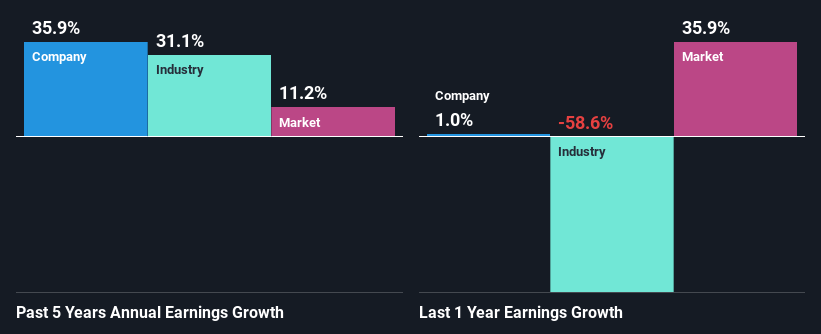Clover Corporation Limited's (ASX:CLV) Stock Has Been Sliding But Fundamentals Look Strong: Is The Market Wrong?
With its stock down 14% over the past three months, it is easy to disregard Clover (ASX:CLV). However, stock prices are usually driven by a company’s financial performance over the long term, which in this case looks quite promising. In this article, we decided to focus on Clover's ROE.
Return on Equity or ROE is a test of how effectively a company is growing its value and managing investors’ money. In short, ROE shows the profit each dollar generates with respect to its shareholder investments.
Check out our latest analysis for Clover
How To Calculate Return On Equity?
ROE can be calculated by using the formula:
Return on Equity = Net Profit (from continuing operations) ÷ Shareholders' Equity
So, based on the above formula, the ROE for Clover is:
19% = AU$10m ÷ AU$56m (Based on the trailing twelve months to January 2021).
The 'return' refers to a company's earnings over the last year. So, this means that for every A$1 of its shareholder's investments, the company generates a profit of A$0.19.
Why Is ROE Important For Earnings Growth?
Thus far, we have learned that ROE measures how efficiently a company is generating its profits. Based on how much of its profits the company chooses to reinvest or "retain", we are then able to evaluate a company's future ability to generate profits. Assuming all else is equal, companies that have both a higher return on equity and higher profit retention are usually the ones that have a higher growth rate when compared to companies that don't have the same features.
Clover's Earnings Growth And 19% ROE
At first glance, Clover seems to have a decent ROE. Especially when compared to the industry average of 9.9% the company's ROE looks pretty impressive. This probably laid the ground for Clover's significant 36% net income growth seen over the past five years. We believe that there might also be other aspects that are positively influencing the company's earnings growth. For instance, the company has a low payout ratio or is being managed efficiently.
As a next step, we compared Clover's net income growth with the industry and found that the company has a similar growth figure when compared with the industry average growth rate of 31% in the same period.
Earnings growth is a huge factor in stock valuation. What investors need to determine next is if the expected earnings growth, or the lack of it, is already built into the share price. Doing so will help them establish if the stock's future looks promising or ominous. Is Clover fairly valued compared to other companies? These 3 valuation measures might help you decide.
Is Clover Efficiently Re-investing Its Profits?
Clover's three-year median payout ratio is a pretty moderate 36%, meaning the company retains 64% of its income. By the looks of it, the dividend is well covered and Clover is reinvesting its profits efficiently as evidenced by its exceptional growth which we discussed above.
Besides, Clover has been paying dividends for at least ten years or more. This shows that the company is committed to sharing profits with its shareholders. Based on the latest analysts' estimates, we found that the company's future payout ratio over the next three years is expected to hold steady at 42%. Accordingly, forecasts suggest that Clover's future ROE will be 18% which is again, similar to the current ROE.
Summary
On the whole, we feel that Clover's performance has been quite good. In particular, it's great to see that the company is investing heavily into its business and along with a high rate of return, that has resulted in a sizeable growth in its earnings. With that said, the latest industry analyst forecasts reveal that the company's earnings growth is expected to slow down. To know more about the company's future earnings growth forecasts take a look at this free report on analyst forecasts for the company to find out more.
This article by Simply Wall St is general in nature. We provide commentary based on historical data and analyst forecasts only using an unbiased methodology and our articles are not intended to be financial advice. It does not constitute a recommendation to buy or sell any stock, and does not take account of your objectives, or your financial situation. We aim to bring you long-term focused analysis driven by fundamental data. Note that our analysis may not factor in the latest price-sensitive company announcements or qualitative material. Simply Wall St has no position in any stocks mentioned.
Have feedback on this article? Concerned about the content? Get in touch with us directly. Alternatively, email editorial-team (at) simplywallst.com.

